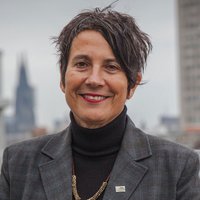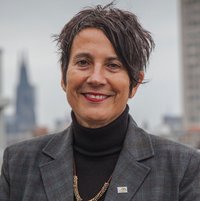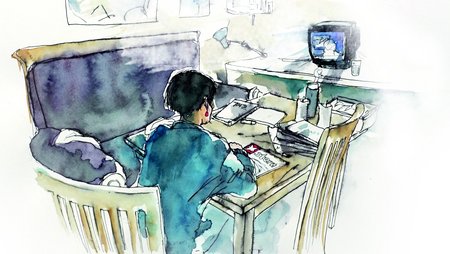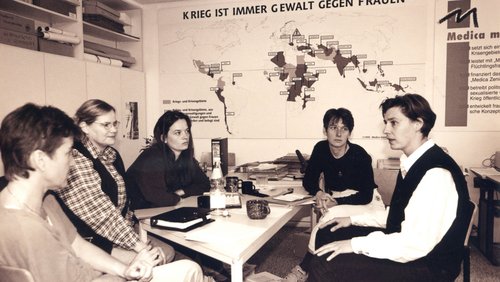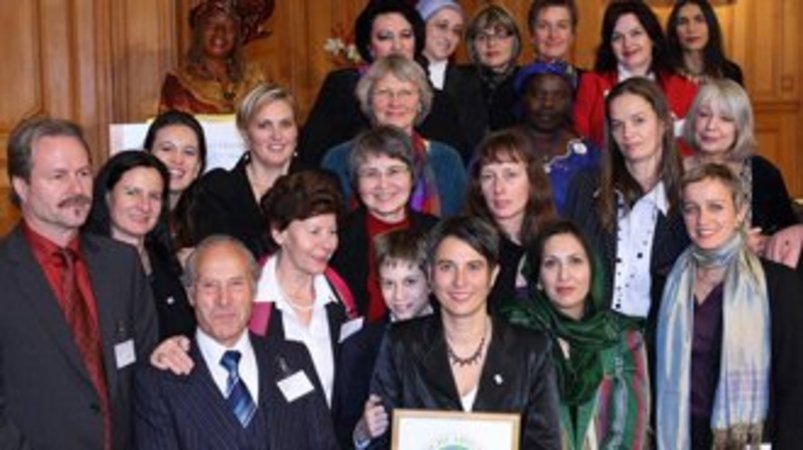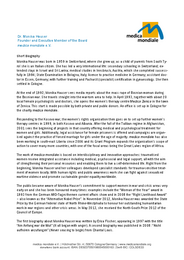Courage and solidarity – Monika Hauser
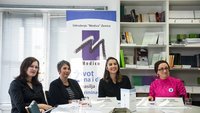
When Monika Hauser, still studying to be a gynaecologist, sets off for Bosnia in the middle of the Yugoslav War in 1992, many people think she is crazy. But the young doctor not only has courage, but also a plan: she wants to create a safe place for the women who have been raped and traumatised in the war, and their children, in order to help them receive medical and psychological assistance. Then as now she is driven by the conviction that women have to join together in solidarity in order to stand up to injustice and violence. Nonetheless, she could not foresee how her unconditional solidarity with the affected women and girls would, within a few years, lead to the establishment of an international women's rights organisation working together with partners across the world to achieve social change.
The world just stands by – Monika Hauser sets off into the war zone
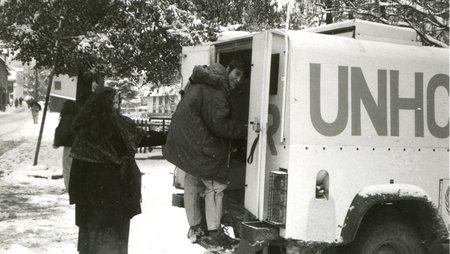
In autumn 1992, Monika Hauser is overcome with rage as she sees media reports of the mass rapes against Bosnian women during the Balkan Wars. She is angry about the terrors these women are being subjected to. But she is also angry about the manner of reporting, which itself is another form of violence committed against them. The international community and relief organisations are just standing there, doing nothing, so the young gynaecologist decides to act herself and travel directly into the war zone.
Anger and determination were the forces which drove me to Bosnia in the winter of 1992 – straight into a war zone. At the time, the media were full of reports about the mass rapes in the Balkans. But there was a striking lack of reports on any help for the traumatised women.
“I said to myself: I can’t just sit on the sofa and keep reading these reports.”
Even as a young girl she knew: Violence is an everyday part of women’s lives
As a child, Monika Hauser already learns that “women and violence are somehow connected” as she listens to her grandmother in South Tyrol. Visiting her in her home village, the young Monika Hauser hears stories of the everyday hardships that women experience. And she also hears that many women and girls have to suffer widespread sexualised violence.
Medical studies and growing resistance
After finishing school, Monika Hauser (b. 1959) studies medicine in Innsbruck and Bologna, followed by the specialist studies to become a gynaecologist. During her Practical Year in the hospital in Schlanders, South Tyrol, in 1984, she already begins to develop feelings of resistance towards the male-dominated hospital environment. Above all, it is the insensitive manner of dealing with female patients, especially in the maternity ward, that fuel her ire.
Female patients tell Monika Hauser about a range of violence
She encounters similar behaviour at Essen University Hospital, where she initially works after finishing her studies. The young doctor listens to her patients and finds out that their injuries and other physical symptoms are often signs of humiliation, rape and abuse. This experience shapes her view of the structural causes of violence and sets the course for the integrated approach she begins to develop and adopt.
“This period radicalised me in a very positive way.. Many women trusted me with their stories. I listened to them and put a name (‘violence’) to their experiences. By doing this I annoyed many people - the husbands, the parish priests. So I quickly developed a lot of resilience.”
Supporting women together with local specialists
As a gynaecologist, Monika Hauser knows the suffering which raped Bosnian women and girls are going through and she knows that they need urgent medical and psychological assistance. Arriving in Bosnia, she quickly manages to make contact with local female psychologists and doctors who also want to support the survivors.
The first women’s centre, Medica Zenica
With the help of material and financial assistance from donors in Germany, in 1993 they set up a women’s centre together in the city of Zenica, offering survivors a safe place to stay. The women and their children can rest and recuperate here, receiving medical and psychological care. Soon a second and third centre are opened. The aid project Medica Zenica is the first of many that would later be assisted around the world by medica mondiale.
In Cologne, medica mondiale is founded
Supporters in Germany demonstrate active solidarity with Monika Hauser’s mission in Bosnia. They conduct public relations, fundraise, and organise the logistics to supply clothing, food, medical equipment, sanitary products and even office equipment to the women’s centres. They set up an office in Cologne, and in May 1993 they found the charitable association "Medica", which was later renamed medica mondiale.
“My intervention to secure a fairer world for women and girls has always been shaped and accompanied by the solidarity and assistance of feminist colleagues, supporters, specialists and friends, in Cologne and around the world. I am very proud that we could set up medica mondiale as a strong organisation which continues our struggle for women’s rights in an effective and tenacious manner.”
Further projects are set up internationally
Monika Hauser ends up dedicating her life to working for the rights and protection of women and girls. In subsequent years, she and her colleagues travel to more areas inflicted by war and crises: Kosovo, Rwanda, Liberia and Afghanistan. They are all places where women and girls are being subjected to sexualised wartime violence, yet receive hardly any support. They adopt a deliberate policy of seeking out local female specialists and women’s initiatives whose work can be enhanced by offering them assistance.
Medical support on its own is not sufficient
From working as a doctor and from many encounters with local survivors, Monika Hauser knows that more than just medical assistance is needed if the physical injuries and psychological trauma caused by this violence are to heal. She is convinced that integrated healthcare needs to be combined with psychosocial support and as well as help to generate a livelihood and fight for justice.
An integrated approach based on solidarity and sensitivity to stress and trauma
Together with the constantly growing team at medica mondiale in Cologne and local partners, in the coming following years Monika Hauser develops the Stress- and Trauma-sensitive Approach (STA) to provide integrated support to survivors of violence. In many places in the world the necessary expertise is lacking, so medica mondiale organises training courses on how to deal with traumatised survivors.
Political advocacy work to combat structural causes
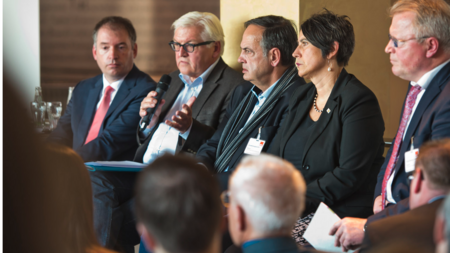
In addition to providing direct assistance to the women, medica mondiale always works politically too. Everyone is aware that the rapes during the Yugoslav Wars are not a new phenomenon and that the women’s suffering is never just their individual fate. In fact, sexualised wartime violence is a worldwide phenomenon whose causes lie in patriarchal structures and the systematic oppression of women.
Raising public awareness and raising funds
In order to draw attention to ongoing breaches of human rights and to raise funds for the projects of medica mondiale and its local women's organisation partners, Monika Hauser is constantly on the move. Networking work, giving interviews, speaking at conferences, writing applications and campaigning for donations. The solidarity she experienced when she first started out has convinced her of the potential for women to achieve change when they join together. And she is equally convinced that our entire society needs to come together to counteract stigmatisation.
Tirelessly intervening for justice
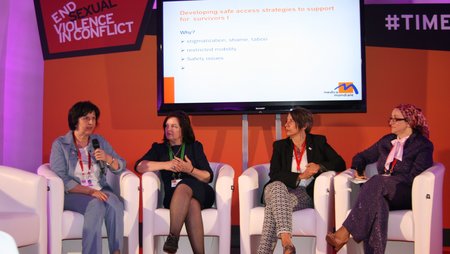
Even today, she does not let loose, tenaciously campaigning to help women and girls around the world experience justice and acknowledgement. She demands more commitment wherever she goes: Whether in London in 2014 at the “Global Summit to End Sexual Violence in Conflict” initiated by the then British Foreign Minister William Hague and the UNHCR Special Envoy Angelina Jolie, in Geneva in 2018 at the “Peace Talks” at the United Nations, or in Berlin in 2019 at the conference hosted by the German Foreign Office on “Advocating Human Rights in the 21st Century”.
“Rape is a very efficient method to silence women! And it is always about intimidation.”
Awards for her commitment
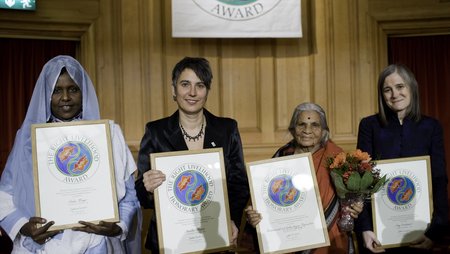
Her ongoing commitment to women's rights has led to Monika Hauser being awarded numerous prizes and awards. Perhaps the most important was the so-called Alternative Nobel Prize – the Right Livelihood Award – in 2008. The jury recognised her “tireless commitment to working with women who have experienced the most horrific sexual violence in some of the most dangerous countries in the world, and campaigning for them to receive social recognition and compensation”.
Her prominence enables further expansion of the work
Having come to prominence in this way, Monika Hauser and her team at medica mondiale take advantage of the opportunities to raise public awareness of the causes and consequences of sexualised violence, seek new partnerships, and expand and develop the work of medica mondiale with local partner organisations in further war and crisis areas such as the Democratic Republic of Congo, Burundi and Iraq.
Solidarity is stronger than violence
Monika Hauser “has never stopped starting”, even today. Wherever women and girls are experiencing violence and oppression, the women's rights organisation that she founded, medica mondiale, will campaign for their rights. The conviction that keeps Monika Hauser going after almost 30 years is that solidarity and justice begin with ourselves. And that mutual support is stronger than any violence.
“As civil society, we do not bear the responsibility for false politics. But we should assume responsibility for whether we each use the resources and strength available to us to bring about change and work for the dignity of female survivors – and for the sake of our own dignity!”
